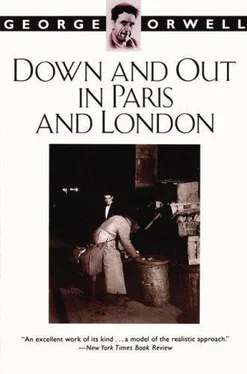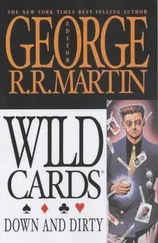George Orwell - Down and Out in Paris and London
Здесь есть возможность читать онлайн «George Orwell - Down and Out in Paris and London» весь текст электронной книги совершенно бесплатно (целиком полную версию без сокращений). В некоторых случаях можно слушать аудио, скачать через торрент в формате fb2 и присутствует краткое содержание. Жанр: Старинная литература, на русском языке. Описание произведения, (предисловие) а так же отзывы посетителей доступны на портале библиотеки ЛибКат.
- Название:Down and Out in Paris and London
- Автор:
- Жанр:
- Год:неизвестен
- ISBN:нет данных
- Рейтинг книги:5 / 5. Голосов: 1
-
Избранное:Добавить в избранное
- Отзывы:
-
Ваша оценка:
- 100
- 1
- 2
- 3
- 4
- 5
Down and Out in Paris and London: краткое содержание, описание и аннотация
Предлагаем к чтению аннотацию, описание, краткое содержание или предисловие (зависит от того, что написал сам автор книги «Down and Out in Paris and London»). Если вы не нашли необходимую информацию о книге — напишите в комментариях, мы постараемся отыскать её.
Down and Out in Paris and London — читать онлайн бесплатно полную книгу (весь текст) целиком
Ниже представлен текст книги, разбитый по страницам. Система сохранения места последней прочитанной страницы, позволяет с удобством читать онлайн бесплатно книгу «Down and Out in Paris and London», без необходимости каждый раз заново искать на чём Вы остановились. Поставьте закладку, и сможете в любой момент перейти на страницу, на которой закончили чтение.
Интервал:
Закладка:
to' bury their money. If they intend to smuggle at ah a
large sum into the spike they generally sew it into their
clothes, which may mean prison if they are caught, of
course. Paddy and Bozo used to tell a good story about
this. An Irishman (Bozo said it was an Irishman; Paddy
said an Englishman), not a tramp, and in possession of
thirty pounds, was stranded in a small village where-he
could not get a bed. He consulted a tramp, who advised
him to go to the workhouse. It is quite a
regular proceeding, if one cannot get a bed elsewhere, to
get one at the workhouse, paying a reasonable sum for it.
The Irishman, however, thought he would be clever and
get a bed for nothing, so he presented himself at the
workhouse as an ordinary casual. He had sewn the thirty
pounds into his clothes. Meanwhile the tramp who had
advised him had seen his chance, and that night he
privately asked the Tramp Major for permission to leave
the spike early in the morning, as he had to see about a
job. At six in the morning he was released, and went out-
in the Irishman's clothes. The Irishman complained of
the theft, and was given thirty days for going into a
casual ward under false pretences.
XXXV
ARRIVED at Lower Binfield, we sprawled for a long time
on the green, watched by cottagers from their front gates.
A clergyman and his daughter came and stared silently
at us for a while, as though we had been aquarium
fishes, and then went away again. There were several
dozen of us waiting. William and Fred were there, still
singing, and the men who had fought, and Bill the
moocher. He had been mooching from bakers, and had
quantities of stale bread tucked away between
his coat and his bare body. He shared it out, and we were
all glad of it. There was a woman among us, the first
woman tramp I had ever seen. She was a fattish,
battered, very dirty woman of sixty, in a long, trailing
black skirt. She put on great airs of dignity, and if any-
one sat down near her she sniffed and moved farther off.
"Where you bound for, missis?" one of the tramps
called to her.
The woman sniffed and looked into the distance.
"Come on, missis," he said, "cheer up. Be chummy.
We're all in the same boat 'ere."
"Thank you," said the woman bitterly, "when I want to
get mixed up with a set of
tramps , I'll let you know."
I enjoyed the way she said
tramps . It seemed to show you
in a flash the whole of her soul; a small, blinkered,
feminine soul, that had learned absolutely nothing from
years on the road. She was, no doubt, a respectable widow
woman, become a tramp through some grotesque accident.
The spike opened at six. This was Saturday, and we were
to be confined over the week-end, which is the usual
practice; why, I do not know, unless it is from a vague
feeling that Sunday merits something disagreeable.
When we registered I gave my trade as "journalist." It
was truer than "painter," for I had sometimes earned
money from newspaper articles, but it was a silly thing
to say, being bound to lead to questions. As soon as we
were inside the spike and had been lined up for the
search, the Tramp Major called my name. He was a stiff,
soldierly man of forty, not looking the bully he had been
represented, but with an old soldier's gruffness. He said
sharply:
"Which of you is Blank?" (I forget what name I had
given.)
"Me, sir."
"So you are a journalist?"
"Yes, Sir," I said, quaking. A few questions would
betray the fact that I had been lying, which might mean
prison. But the Tramp Major only looked me up and down
and said:
"Then you are a gentleman?" "I suppose so."
He gave me another long look. "Well, that's bloody bad
luck, guv'nor," he said; "bloody bad luck that is." And
thereafter he treated me with unfair favouritism, and even
with a kind of deference. He did not search me, and in the
bathroom he actually gave me a clean towel to myself-an
unheard-of luxury. So powerful is the word "gentleman"
in an old soldier's ear.
By seven we had wolfed our bread and tea and were in our
cells. We slept one in a cell, and there were bedsteads and
straw palliasses, so that one ought to have had a good
night's sleep. But no spike is perfect, and the peculiar
shortcoming at Lower Binfield was the cold. The hot pipes
were not working, and the two blankets we had been given
were thin cotton things and almost useless. It was only
autumn, but the cold was bitter. One spent the long
twelve-hour night in turning from side to side, falling
asleep for a few minutes and waking up shivering. We
could not smoke, for our tobacco, which we had managed
to smuggle in, was in our clothes and we should not get
these back till the morning. All down the passage one
could hear groaning noises, and sometimes a shouted oath.
No one, I imagine, got more than an hour or two of sleep.
In the morning, after breakfast and the doctor's inspection,
the Tramp Major herded us all into the dining-room and
locked the door upon us. It was a
limewashed, stone-floored room, unutterably dreary, with
its furniture of deal boards and benches, and its prison
smell. The barred windows were too high to look out of,
and there were no ornaments save a clock and a copy of
the workhouse rules. Packed elbow to elbow on the
benches, we were bored already, though it was barely
eight in the morning. There was nothing to do, nothing to
talk about, not even room to move. The sole consolation
was that one could smoke, for smoking was connived at so
long as one was not caught in the act. Scotty, a little hairy
tramp with. a bastard accent sired by Cockney out of
Glasgow, was tobaccoless, his tin of cigarette ends having
fallen out of his boot during the search and been
impounded. I stood him the makings of a cigarette. We
smoked furtively, thrusting our cigarettes into our pockets,
like schoolboys, when we heard the Tramp Major coming.
Most of the tramps spent ten continuous hours in this
comfortless, soulless room. Heaven knows how they put
up with it. I was luckier than the others, for at ten o'clock
the Tramp Major told off a few men for odd jobs, and he
picked me out. to help in the workhouse kitchen, the most
coveted job of all. This, like the clean towel, was a charm
worked by the word "gentleman."
There was no work to do in the kitchen, and I sneaked
off into a small shed used for storing potatoes, where
some workhouse paupers were skulking to avoid the
Sunday morning service. There were comfortable packing-
cases to sit on, and some back numbers of the
Family
Herald
, and even a copy of
Raffles from the workhouse
library. The paupers talked interestingly about workhouse
life. They told me, among other things, that the thing
really hated in the workhouse, as a stigma of charity, is
the uniform; if the men could
wear, their own clothes, or even their own caps and
scarves, they would not mind being paupers. I had my
dinner from the workhouse table, and it was a meal fit for
a boa-constrictor-the largest meal I had 'eaten since my
first day at the Hôtel X. The paupers said that they
habitually gorged to the bursting-point on Sunday and
were underfed the rest of the week. After dinner the cook
set me to do the washing up, and told me to throw away
Читать дальшеИнтервал:
Закладка:
Похожие книги на «Down and Out in Paris and London»
Представляем Вашему вниманию похожие книги на «Down and Out in Paris and London» списком для выбора. Мы отобрали схожую по названию и смыслу литературу в надежде предоставить читателям больше вариантов отыскать новые, интересные, ещё непрочитанные произведения.
Обсуждение, отзывы о книге «Down and Out in Paris and London» и просто собственные мнения читателей. Оставьте ваши комментарии, напишите, что Вы думаете о произведении, его смысле или главных героях. Укажите что конкретно понравилось, а что нет, и почему Вы так считаете.












